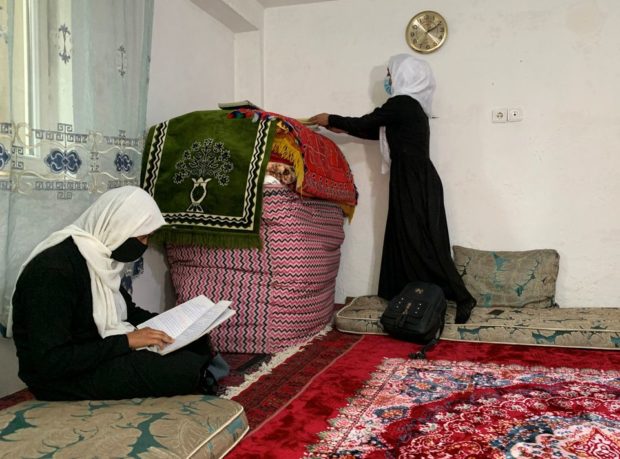World Bank freezes Afghans projects after Taliban bans girls from high school

An Afghan schoolgirl reads from her notebook as another unpacks her school bag inside a house in Kabul, Afghanistan, March 23, 2022. REUTERS
WASHINGTON — The World Bank has put four projects in Afghanistan worth $600 million on hold amid concerns over a decision by the country’s ruling Islamist leaders to ban girls from returning to public high schools, the bank said.
The projects, to be funded under the revamped Afghanistan Reconstruction Trust Fund, were being readied for implementation by United Nations agencies to support projects in agriculture, education, health, and livelihoods.
But the bank’s guidance requires all ARTF-financed activities to support access to – and equity of services for – women and girls in Afghanistan, the bank said, citing its deep concerns over the Taliban’s ban on girls attending high school.
As a result, the bank said, the four projects will be presented to ARTF donors for approval only “when the World Bank and international partners have a better understanding of the situation and confidence that the goals of the projects can be met.” It was not immediately clear when that could occur.
U.S. officials last week cancelled planned meetings in Doha with the Taliban over the decision to keep girls out of secondary school.
Article continues after this advertisementThe executive board of the World Bank on March 1 approved a plan to use more than $1 billion from the ARTF fund to finance urgently needed education, agriculture, health and family programs that would bypass sanctioned Taliban authorities and disburse the money through U.N. agencies and aid groups.
Article continues after this advertisementThe ARTF was frozen in August when the Taliban took power as U.S.-led international troops departed after 20 years of war.
Foreign governments also ended financial aid comprising over 70% of government expenditures, accelerating the country’s economic collapse.
When it agreed to free up ARTF funds for new projects to be implemented by UN agencies, the World Bank had stipulated that it expected a “strong focus on ensuring that girls and women participate and benefit from the support.”
The Taliban has unraveled gains in rights made by women during the last two decades, including restricting them from working and limiting their travel unless accompanied by a close male relative. Most girls were also barred from going to school beyond seventh grade.
But Taliban leaders had said all girls would be allowed to return to classrooms later this month.
RELATED STORIES
UN Security Council asks Taliban to allow Afghan girls to attend school
Girls with rare chance to study under Taliban rule dare to dream
UN says Taliban to announce plans for girls’ education ‘soon’